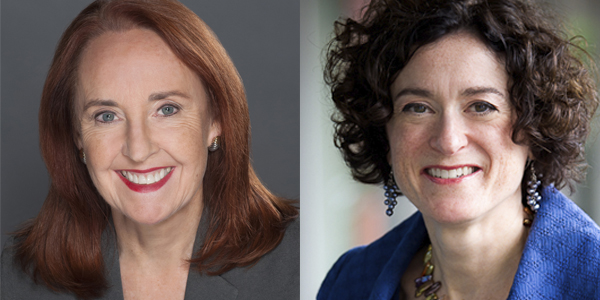Science group CEOs aim to enhance advocacy with closer collaboration
Science group CEOs aim to enhance advocacy with closer collaboration
- November 3, 2017 |
-
 LORI SHARN BRYANT
LORI SHARN BRYANT

Federal budget cuts are urgent concern

Woolley (left) and McEntee
Dozens of scientific organizations vowed to keep the momentum going following the March for Science in April. But the ball was already rolling—and continues to gain traction—as associations work both individually and collectively to advocate for science.
One key way groups are collaborating across many scientific disciplines is through a weekly conference call and a monthly CEO-only breakfast.
"It's been very valuable to people. The way you realize that is folks show up," said Mary Woolley, CEO of Research!America. "It's always at the choice of each group whether to participate in a particular initiative. But everyone is informed."
Woolley and Christine McEntee, CEO of the American Geophysical Union, started an informal breakfast group of their peers in 2011. But after President Donald Trump's election, science association leaders quickly realized the need for more frequent communication. Woolley and McEntee alternate co-chairing the weekly calls.
The number of societies participating in the calls continues to grow, McEntee said. A typical Monday morning call includes about 35 CEOs and 35-45 people such as deputy directors and communication directors.
"I think what's really interesting here is there's a lot of different disciplines that are participating in various activities, but we're all united behind the need to increase federal investment in research," McEntee said. "Certainly everybody is concerned right now about the budget process and the appropriations process."
Congress has set a Dec. 8 deadline for passing a spending bill for the current fiscal year.
Marching ahead
The March for Science started with an idea that went viral online, and quickly morphed into a phenomenon. A million people may have participated April 22 in more than 600 cities around the world. Many scientists felt energized by the outpouring of support and solidarity.
Dozens of associations endorsed the march as a celebration of science, though there were concerns about how it might be perceived as a partisan event. Trump has repeatedly questioned climate science and has appointed people to key positions who have espoused similar views. He has proposed cutting key science agencies and has yet to appoint a White House science adviser.
The March for Science organization has applied with the IRS to become a registered nonprofit. On Nov. 10, World Science Day, the group intends to roll out the first phase of a new campaign, Vote for Science. The campaign aims to register and mobilize voters in advance of the 2018 elections.
However, the grassroots organization has struggled since the beginning with issues ranging from diversity to messaging to finances. A group of volunteers and former volunteers posted an open letter Oct. 23 about their concerns with transparency and management.
Woolley said Research!America and several other organizations are interested in the Vote for Science concept. Research!America has been doing voter education initiatives before elections for years.
Rush Holt, CEO of the American Association for the Advancement of Science, said there have been discussions about developing a major campaign to restore public appreciation of science, which could involve scientific societies, foundations and individual philanthropists.
"There is a real change that has occurred that that isn't part of any organization," Holt said. "A lot of scientists and friends of science have already stepped over the threshold of public involvement. So in a sense, there's no going back," he said.
When Woolley and McEntee started the meetings for Washington, D.C.-based CEOs in 2011, there wasn't much going on to break down silos in science advocacy, Woolley said.
"We both agreed that there were too many people who didn't know each other in the broad community of science and science societies," Woolley said.
Initially, the breakfasts were every six weeks to two months. Now they are monthly, and 20-30 CEOs attend. It is not always the same people every time, Woolley said, and the hosts rotate.
The weekly calls are early on Monday mornings. In a quick 30 minutes or so, McEntee said participants discuss what's coming up that week, what different groups are working on, and what they might think of doing together.
Some of the participating organizations include American Association for the Advancement of Science, American Chemical Society, Association for Research in Vision and Ophthalmology, Consortium of Social Science Associations, Federation of American Societies for Experimental Biology and U.S. Pharmacopeial Convention.
The weekly call of science groups helped spread the word about a Twitter campaign launched by the American Psychological Association. APA highlighted the work of researchers who were already active on Twitter during the week of Sept. 18-22, using the hashtag #thankascientist.
The campaign snowballed, said Kirk Waldroff, director of communications for APA's science directorate. He said that more than 100 scientific organizations worldwide joined in using the hashtag, and he saw posts in Italian, German and Arabic as well as English. A hashtag tracker reported more than 5 million impressions on Twitter.
Waldroff said APA has long collaborated with other organizations, but in the past these would mostly be in the health and behavioral fields.
"We've been talking more regularly with more organizations about how to promote researchers and their work," Waldroff said. While not a direct result of the March for Science, "it would be hard to ignore the connection at the same time."

